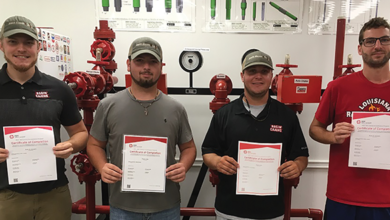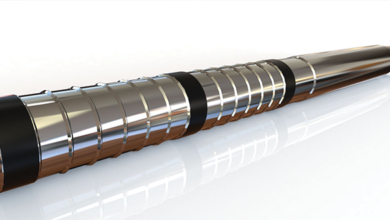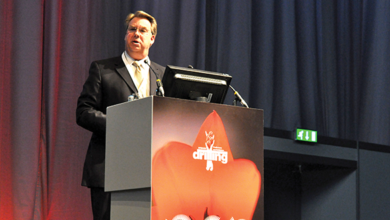By Linda Hsieh, Managing Editor

As a young geologist fresh out of the University of Leeds in England in the late ’70s, Robin Macmillan recalls getting his first job and going out to land rigs in South Texas working as a mud logger. Once he got there, however, he realized he was much more fascinated with the drilling process than with collecting the cuttings coming over the shakers.
“Very quickly, my focus became drilling engineering rather than oilfield geology,” Mr Macmillan, now Senior VP for Business Development at National Oilwell Varco (NOV), said. “The mechanical challenge of getting this rig to make a hole in the ground for several thousand feet while controlling the downhole pressure – it fascinated me.”
For a few years, Mr Macmillan worked for Core Lab in South Texas and Libya, then for Baroid in places as varied as Gabon, Congo, Syria, Norway and Spain. “I was also working in Mexico in the early days when Pemex was just starting to explore offshore Ciudad del Carmen. It was an exciting time.”
But then the ’80s rolled around, and Mr Macmillan found himself a victim of an unforgiving downturn, so he headed back to England and began teaching geology at a local college.
He didn’t give up on the industry, though. When the oil industry picked back up in the early ’90s, he dived in again, joining Hycalog’s drill bits business. “I think we’re seeing the same thing happening right now. A lot of young people left the industry during this downturn, and you think they probably have gone somewhere else, but the oilfield eventually pulls you back. It’s a really exciting business, and I’ve never regretted coming back into this trade,” he said.
Getting back into the drilling industry, Mr Macmillan also learned to appreciate the time he had spent both offshore and on land rigs, recognizing how that work paved a solid understanding of the drilling process. “The good thing about the logging shack is that it’s connected to all the sensors on the rig, so everyday you’re watching all the parameters of the drilling process. You’re the first person on the rig to see gas or a change in flow, and you see when drilling is efficient and when it’s not. You become very tuned in to the whole process,” he said.
This intimate understanding of drilling came in handy in the bits business, he found out. “If you’re going to recommend a drill bit, you need to know not just the geology but also the rig, the mud, the casing, the downhole motor, etc. You have to talk drilling.”
One of the most memorable projects he worked on during this time was Wytch Farm in the UK, which was operated by BP during the mid-’90s. The project called for extended-reach horizontal wells that had rarely been drilled before.
“This was when we really started to learn about long step-out wells,” he said. At the time, Hycalog was a part of Camco, which developed one of the industry’s first-ever rotary steerable systems. “The demands of that project actually created the need for new technology.”
During Mr Macmillan’s time working on Wytch Farm, the project even set a world record for the longest drill bit run, at 13,170 ft. “That was a big moment,” he recalled.
At that time Mr Macmillan was District Manager in Great Yarmouth, England, before moving to Venezuela, where he first served as Country Manager, then as Manager for Northern Latin America.
Through acquisitions, Hycalog became ReedHycalog and also became a part of Schlumberger. In 2000, he moved to Canada and started overseeing Schlumberger Drilling and Measurements, and by 2008, he had been appointed President of ReedHycalog. That same year, NOV acquired Grant Prideco, which had acquired ReedHycalog. After joining NOV through these acquisitions, Mr Macmillan first served as a VP in Europe before moving to Houston in his current role.
“It’s actually quite satisfying,” he said, to see technologies developed by ReedHycalog and GrantPrideco – downhole sensors and wired drill pipe – coming together with an advanced rig control system, NOVOS, developed by NOV. “It’s this convergence of technologies that is enabling closed-loop automated drilling, and it is these improvements in efficiency that are enabling our industry to drill its way out of the downturn.”
The level of predictability and consistency that can be achieved is not only helping to make more projects economically viable for operators, but it’s also improving the drilling process. “It lets the driller take a step back and be a supervisor of the automated process, so they can concentrate on the safety of the crew and the efficiency of the operation.”
Automation is also the underlying theme of Mr Macmillan’s work with the IADC Advanced Rig Technology Committee; he is on the second year of a two-year term as Chairman. Projects he’s overseen during this time include the publication of guidelines on alarm management, cybersecurity and control valve qualification testing.
The group is now embarking on a project to revamp the IADC Daily Drilling Report, in print and electronic formats. “It’s a significant undertaking, but I think it’s necessary as data management evolves at the wellsite in the coming years. We’ll be working to design a system that will allow the data being generated to be automatically fed into a daily report, while allowing people who want to fill it in manually to keep doing that. We’ll also be building in flexibility because we recognize that the industry is moving fast, and we have to consider what our needs might be in the future.” DC





